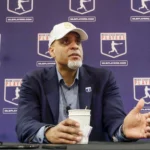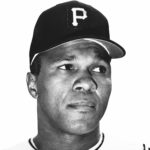This is a story about HOFer Aaron Pointer.
The chances are pretty good that even the most diehard baseball fan in Tacoma doesn’t know how badly one of its most celebrated citizens is being treated by the suits who run Major League Baseball (MLB) and the union representing today’s current players, the Major League Baseball Players Association (MLBPA).

A former Houston Astro, Aaron Pointer, who was inducted into the Tacoma Hall of Fame in 2008, does not get a pension from MLB. All Pointer has been getting since 2011 are non-qualified retirement payments of $625 for every 43 game days he was on an active MLB roster, up to a maximum payment of $10,000. Meanwhile, a vested retiree can receive up to $225,000, according to the IRS.
The older brother of Ruth, Anita, Bonnie and June Pointer – a.k.a “The Pointer Sisters” – the 75-year-old Pointer played for the Houston Colt 45s in 1963 then, when the team became the Astros, played for that club in 1966 and 1967. Overall, in 40 career games, Mr. Pointer came to the plate 101 times and collected 21 hits, including five doubles and two home runs. He scored 11 runs and drove in an additional 14.
After hanging up his spikes, Pointer worked for the Pierce County Parks & Recreation Department in Tacoma, Washington for 29 years. In that capacity, he supervised the scheduling of athletic activities.
A true diversity pioneer, between 1978-1987, Pointer began officiating Pacific-10 Conference (PAC)-10 games. He was the first African American ref in the PAC-10. Pointer then worked National Football League (NFL) games from 1987 – 2003. He was an NFL head linesman.
Pointer currently serves on the Metropolitan Park District of Tacoma Board of Commissioners as well as on the Executive Board of the Tacoma Athletic Commission.
Pointer is in this position because the rules for receiving MLB pensions changed in 1980. They don’t receive a pension because he didn’t accrue four years of service credit. That was what ballplayers who played between 1947-1979 needed to be eligible to be vested.
However, ever since 1980, all you’ve needed is one game day of service to be eligible to buy into the league’s health insurance coverage plan and 43 game days for a pension.
The problem is, nobody from the MLBPA insisted at the time that this change be made retroactive.
To make matters worse, the non-qualified retirement payment cannot be passed on to a surviving spouse or designated beneficiary.
So when Pointer passes, that money he’s now receiving doesn’t go to his wife, Leona.
It’s gone for good.
To date, the MLBPA has been loath to divvy up anymore of the collective pie to help these men. Even though the current players’ pension and welfare benefits fund is valued at more than $3.5 billion, MLBPA Executive Director Tony Clark – the first former player to ever hold that position, by the way – has never commented about these non-vested retirees, many of whom are filing for bankruptcy at advanced ages, having banks foreclose on their homes and are so sickly and poor that they cannot afford adequate health care coverage.
Instead, Clark is enriching the people who work at the union’s offices at 12 East 49th Street. According to the MLBPA’s own IRS filing, the 72 staff members working for the union in 2015 earned $16 million. Clark leads the way, getting $2.1 million on top of his own MLB pension.
Is that fair? Of course not.
The license agreements the players’ union has with such brands as Topps and VF Knitwear could help pay more monies to men such as Pointer and former New York Mets outfielder Billy Murphy, who also lives in Tacoma. Thanks to those agreements, the MLBPA grow its asset base 27 percent from 2015 to 2016. And license fees were up to a staggering $51.2 million, an increase of 16 percent for the same period.
We put a great premium on helping the future generation in this country. And rightfully so. Our kids are our future. But let’s have a little healthy respect for our seniors too. Clark and the union should go to bat for the men like Pointer – they’re the ones who helped grow the game by standing on picket lines, going without paychecks and enduring labor stoppages all so someone like Bryce Harper could sign a 13-year contract as a free agent and command $330 million in salary.
And here’s one other thing – like Pointer, Clark is an African American who received the prestigious Jackie Robinson Award from the Negro Leagues Museum in 2016. He should want to help men like Pointer if only to live up to the standards set by that social justice pioneer.
Clark might be helping grow the game for the likes of Harper, but he needs to do something about Pointer’s situation as well.
Douglas J. Gladstone authored the book, “A Bitter Cup of Coffee; How MLB & The Players Association Threw 874 Retirees a Curve.”
Author Profile
Latest entries
 MLBDecember 14, 2022A Tale of Two Wyomingites
MLBDecember 14, 2022A Tale of Two Wyomingites MLBJuly 2, 2022Asking for Accountability From a POC Isn’t Bigotry
MLBJuly 2, 2022Asking for Accountability From a POC Isn’t Bigotry MLBFebruary 5, 2022A Valentine’s Appeal to Tony Clark, Executive Director, Major League Baseball Players’ Association
MLBFebruary 5, 2022A Valentine’s Appeal to Tony Clark, Executive Director, Major League Baseball Players’ Association MLBJanuary 19, 2022MLB: Pre-1980 Players Without a Pension List Now Stands at 525
MLBJanuary 19, 2022MLB: Pre-1980 Players Without a Pension List Now Stands at 525
